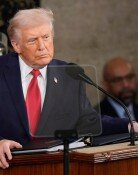Han Duck-soo poised to declare presidential candidacy
Han Duck-soo poised to declare presidential candidacy
Posted April. 30, 2025 08:04,
Updated April. 30, 2025 08:04
Acting President Han Duck-soo appears to be on the verge of declaring his candidacy in the upcoming presidential election. His chief of staff, a close aide, has already resigned, and key officials, including the public affairs and political affairs chiefs, are stepping down alongside Han. These developments are being treated as a foregone conclusion within the prime minister’s office. Han is expected to resign on May 1 and announce his candidacy the following day, forming a campaign team centered around his departing aides.
The ruling People Power Party (PPP) has been openly encouraging Han’s move. Reports indicate that Kwon Young-se, the party’s emergency committee chair, asked a senior politician scheduled to meet Han to help unify the candidacy. On April 29, PPP floor leader Kweon Seong-dong further fanned speculation by stating that after narrowing the field to two contenders, Kim Moon-soo and Han Dong-hoon, the party intends to hold a unification runoff once a frontrunner emerges.
There is growing concern that Han’s candidacy undermines the integrity of his role as acting president, whose duty is to neutrally oversee the election and ensure stable governance during the transitional period. Many question whether it is appropriate for someone who served as second-in-command under an ousted president to run as a candidate himself. Yet neither Han nor the PPP seem concerned by such criticism. While it remains unclear what justification Han will offer if he runs, it will be difficult for him to avoid the harsh judgment of the public.
Speculation is mounting that behind-the-scenes talks between Han and the PPP are already underway to secure a unified candidacy. However, even if a unification runoff is held, it will likely trigger legal and political controversy. Should Han join the PPP and compete against the party’s primary winner in a second round, accusations of favoritism and “automatic advancement” could arise. Party members who voted in the primary might also file legal challenges, citing infringement of their rights.
This presidential election was prompted by the impeachment and removal of former President Yoon Suk-yeol over unconstitutional and unlawful martial law. Yet the PPP and former ruling party figures are now focused solely on electoral tactics for unification, showing no serious reflection on Yoon’s misrule or the crisis that led to his ouster. While their strategy may be aimed at countering Democratic Party candidate Lee Jae-myung, it is doubtful such a maneuver will win the hearts of the public.






![‘부화방탕 대명사’ 북한 2인자 최룡해의 퇴장 [주성하의 ‘北토크’]](https://dimg.donga.com/c/138/175/90/1/wps/NEWS/IMAGE/2026/02/27/133414028.1.jpg)
